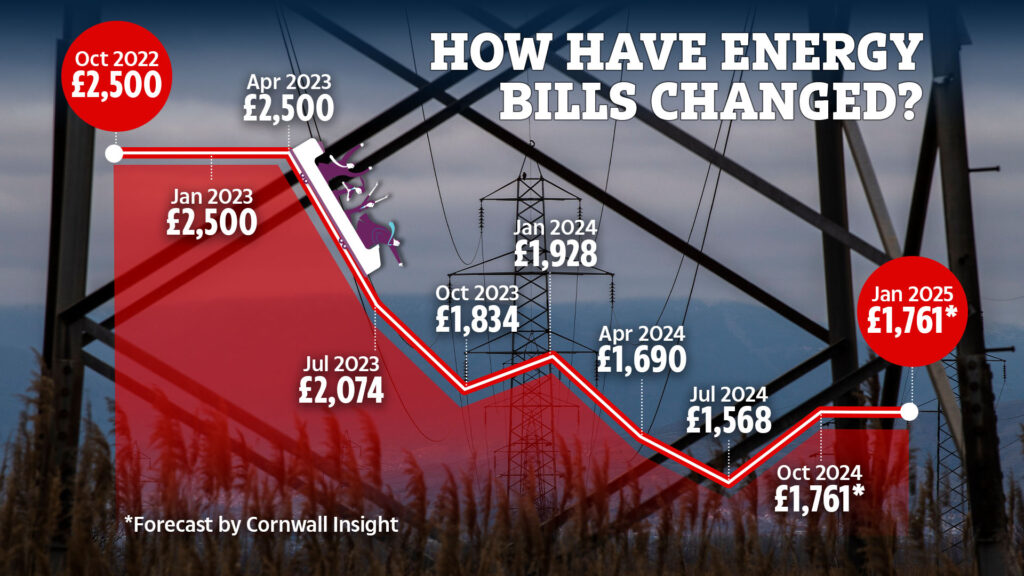MILLIONS of households are on the hook for an energy bill this year.
We explain what’s going on, whether you should consider fixing it, and how to remove it.
WHAT IS HAPPENING?
Over the past few years, energy bills have skyrocketed due to Covid-19 lockdowns, cold winters and geopolitical issues such as Russia’s invasion of Ukraine in early 2022.
The energy price cap limits the price you pay for energy, although your bill will vary depending on how much energy you use.
But households are set for some relief this summer when bills fall to their lowest level in two years after the price cap, which is set by Ofgem, falls on July 1.
The typical cost for 29 million households on their energy supplier’s standard variable tariff will fall from £1,690 a year to £1,568 a year.
However, this drop in cost will be short-lived, according to experts.
This is because Ofgem reviews the price cap every three months.
And the latest forecasts from energy consultants Cornwall Insight suggest typical bills will rise once again to £1,761 in October.
Ben Gallizzi, energy expert at Uswitch.com, said: “Energy bills will fall in July as the price cap falls by 7%, providing relief for households on a standard variable tariff.
“Don’t be lulled into a false sense of security though, as energy analysts suggest rates will rise 12% in October and stay that way over the winter, taking the average annual household bill by £200 to £1,761 .
So what can families do to manage costs? We take a look at the options.
NEED TO FIX?
That’s the question readers are asking us – but the answer isn’t straightforward.
There are two types of energy deals available to customers – standard and fixed rates.
The standard rate is limited by the price cap.
But some major suppliers, including British Gas, Octopus and Ovo Energy, are now offering cheap fixed deals below the current price cap.
Fixing is good if you want security – but it’s a gamble because if prices end up falling, you could be locked into paying more.
Many have hefty exit fees of up to £190 that you have to pay to get out of them.
Consumers should also factor price cap forecasts into their decision.
Ben Gallizzi, of uSwitch.com, added: “It’s impossible to know what energy rates will be in six, nine or 12 months, but as prices continue to fluctuate, the best bet for households who want to avoid uncertainty of payments is to lock in a fixed deal that will give you at least a year of stability.”
James Longley, managing director at Utility Bidder, said: “With Ofgem’s power price set to fall in July, UK customers will be asking whether now is the right time to switch to a fixed energy deal .
“They give clients peace of mind and offer plenty of choice in terms of start and end dates.
“It would be recommended that you look and compare comparison sites to find the best deals for your energy fix, and this should only be considered if you’re locked into the cheapest price.”
Kara Gammell, personal finance expert at MoneySuperMarket added: “With speculation that the price cap could rise in October, switching to a fixed rate now can provide some security if you prefer to know how much your energy will cost over the next 12 months. next.”
WHAT ARE THE BEST FIXED RULES?
There are a handful of fixed deals that beat the October price cap.
For example, Ecotricity is currently offering its 1-year fixed green fee, which costs a typical household £1,540 a year – £150 less than Ofgem’s price cap.
This is 2% less than the July price cap (£1,568) but 12.5% cheaper than the predicted October cap.
This comes with an exit fee of £75 per fuel – so £150 if you lock in a duel fuel charge.
While Outfox the Market Fix’d Dual Jun24 v1.0 tariff will set a typical household back £1,576 a year – 0.5% more than July’s price cap but 10.5% the predicted cap from October .
Octopus Energy’s 12m flat rate costs £1,611 a year, but there are no exit fees if you leave early.
For an average household, this will cost 2.5% more than the July price cap, but 8.5% below the October cap.
Before you switch, make sure you compare prices, as they vary based on where you live and factor in exit fees.
However, customers should also be aware of other changes in the energy market that may affect prices.
TO INTERPRET OR NOT TO INTERPRET?
COMMENT from Tara Evans, Chief Consumer Officer, at The Sun: to fix or not to fix? That’s the question!
I really wish I had Mystic Meg’s Crystal Ball to help answer this question.
As we explain in this article – there are many issues to consider.
I haven’t adjusted my energy bills yet, as I’m interested to see how regulatory changes and elections affect bills.
But whatever you decide, you should compare prices and fees before committing to a switch.
ENERGY MOVEMENTS TO WATCH FOR
Like any good roller coaster, there are some unexpected twists and turns that you should consider before switching.
Regulator Ofgem has revealed plans to end a ban on buy-only charges later this year.
This means energy firms can offer cheap prices to new customers – but loyal ones won’t have access.
The ban was an issue The Sun fought over, as it was destroying loyal customers.
But now, experts think its removal could boost fixed-rate deals and inject competition back into the energy market.
However, one energy firm, Octopus Energy, has told The Sun it will not offer cheaper tariffs, even if the ban is lifted.
The Sun will carefully monitor how it affects prices and customers.
It would be good for competition, but it means the most vulnerable could lose out.
Ofgem is also considering changing the way the price cap works in the future.
This could include a ‘dynamic’ price cap, meaning energy firms could charge more at peak times and less at night, for example.
But these changes have not been agreed upon and there is no timetable yet for when they will happen.
HOW WILL THE ELECTIONS AFFECT FAKE?
The outcome of the election may also affect the bill.
Labor wants to create a publicly owned energy firm called Great British Energy, which it claims will cut household bills by £93bn.
Details remain unclear and the party has not actually explained how it would lead to lower household bills.
The Conservative Party has yet to set out its ambitions to shake up the industry.
YES FLEXIBLE RATES
Customers who do not want to adjust can rely on a standard fee to follow the price limit.
Kara Gammell, personal finance expert at comparison site Money Supermarket Group, says: “These will almost always be at or below the price range.”
For example, E.ON Next’s Pledge variable tariff offers a fixed discount of around three per cent on price cap rates for 12 months.
This will save the average household around £50 a year, but comes with a £50 exit fee if you switch before the end of the year.
The deal is available to new and existing customers.
For a bigger reward, but with a higher risk, Octopus Energy offers two variable tariffs that track wholesale gas and electricity costs.
Customers on Octopus Tracker see their prices change daily, but unit rates have consistently remained below the price cap in recent months.
For example, in the last 30 days, people living in southern England on Octopus Tracker paid a maximum of 20.3p per kWh for electricity and 4.81p per kWh for gas, which is 4.2p and 1.23 p cheaper than the price limit for fuel. .
The Agile Octopus fare works similarly to the Octopus Tracker, the main difference being that the prices of the former change every half hour.
But anyone who wants to switch to any of these tracker rates needs to have a smart meter.
What energy bill help is available?
THERE are a number of different ways to get help to pay your energy bills if you are struggling to make ends meet.
If you fall into debt, you can always approach your supplier to see if they can put you on a repayment plan before putting you on a prepayment meter.
This involves repaying the debt in installments over a specified period.
If your supplier offers you a repayment plan that you don’t think you can afford, talk to them again to see if you can negotiate a better deal.
Some energy firms have grant schemes available for customers struggling to cover their bills.
But eligibility criteria vary depending on the supplier and the amount you can get depends on your financial circumstances.
For example, British Gas or Scottish Gas customers struggling to pay their energy bills can receive grants worth up to £1,500.
British Gas also offers help through its British Gas Energy Trust and Individuals’ Family Fund.
You do not need to be a British Gas customer to apply for the second fund.
EDF, E.ON, Octopus Energy and Scottish Power all offer grants to struggling customers too.
Thousands of vulnerable families are missing out on extra help and protection by not registering on the Priority Services Register (PSR).
The service helps support vulnerable households, such as those who are elderly or ill, and some of the benefits include advance warning of outages, free gas safety checks and extra support if you’re struggling.
Contact your energy company to see if you can apply.



